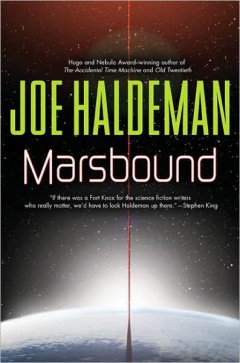

Joe Haldeman began a series with the book Marsbound. Like his other books that I have read, it starts quickly, wastes little time with descriptions, treats people mechanistically, with little emotion or soul, but tells an interesting tale. Marsbound is less entertaining than The Forever War and Forever Peace, but it is still a decent read.
The story begins on Earth, where a university student named Carmen Dula and her family are waiting for a taxi. They are on their way to Earth’s space elevator, which over the course of several days will take them up to a spaceship, which in turn will take them to Mars where they will be staying for the next five years. That is, unless something unexpected pops up.
Carmen gets on the wrong side of the bureaucratic leader of the Mars colony before she even arrives. One night, stinging from a punishment meted out to her and feeling rebellious, she goes for an unapproved walk in her Mars suit. While out, she injures herself and cannot get back. On the verge of death, she is visited by a strange creature who saves her…
[continue reading…]
Help Promote Prometheus Unbound by Sharing this Post
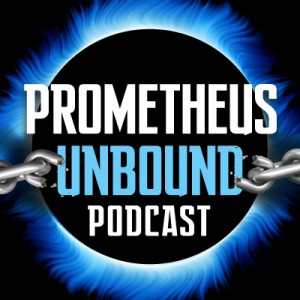
The new year has started off slow for us at Prometheus Unbound as we prepare some major new features and changes, but things are about to take off and I think 2013 is going to be an exciting one.
The Prometheus Unbound Podcast

We’ve been republishing some science-fiction-related episodes from the Mises Institute and Jeff Riggenbach’s Libertarian Tradition podcast, but within the next couple of days we’ll be launching our own original podcast. You’ve probably already listened to our promo for the podcast. We hope you like it and will help us promote the podcast by sharing it around to anyone you think might be interested in liberty and speculative fiction.
For our first episode, we have for you an interview with libertarian legal theorist and patent attorney Stephan Kinsella. If you’re not familiar with Stephan and his work, you may be wondering why we interviewed a patent attorney. Well, Stephan is a leading figure in the movement against intellectual property. After talking about his favorite science fiction and fantasy novels, and the new Hobbit movie, we go on to discuss with him the history and origin of intellectual property; how copyright has shaped and distorted the publishing and film industries; how the internet, piracy, and advancing technology are undermining the intellectual property regime and the antiquated business models built on it; the rise of self-publishing; and more.
In our second episode, we’ll be discussing libertarian speculative fiction. What qualifies a work of fiction as libertarian? What are the best, or our favorite, works of libertarian speculative fiction? Do libertarian authors tend to be too heavy-handed and preachy? Does the Prometheus Award to a good job of finding and promoting libertarian science fiction? Why are so many winners of the award written by authors who are not themselves libertarian? We’ll seek to address these questions and more.
And in episode three, in February, we’ll be interviewing Jeffrey Tucker, the editor of Laissez Faire Books.
Subscribe to our podcast-only rss feed to get episodes directly on your phone, tablet, or mp3 player: http://feeds.feedburner.com/prometheusunbound/podcast.
We hope you enjoy the show and will help us spread the word.
Site Redesign
I’m redesigning the site from the ground up on the new version 2.0 of the Thesis Theme Framework for WordPress. I think it will be much more slick, professional-looking, and powerful than the current design.
[continue reading…]
Help Promote Prometheus Unbound by Sharing this Post
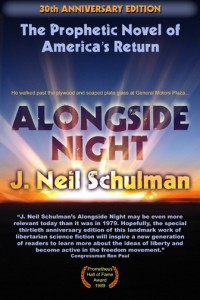
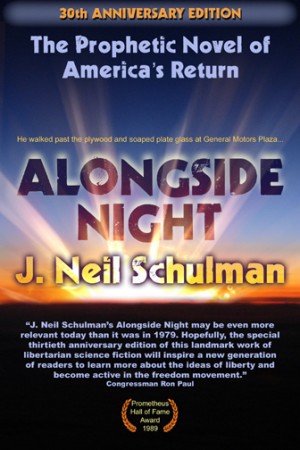
Alongside Night by J. Neil Schulman, so far as I am aware, is still the agorist novel par excellence. More than three decades have passed since its publication — not that you would know it without looking at the copyright date — yet in that time no other novel has so successfully mixed the principles of agorism with such a keen perspective on the future. There are not many novels that can top it for entertainment value either.
The story takes place in what was then the future, but which now seems a very prescient present. Not only is the story filled with theretofore unrealized gadgets and technology that differ from what we actually possess sometimes by no more than an appellation, or occasionally a small feature or manner of use, but the economic conditions described in the tale read like a seer’s forecast.
Schulman’s knowledge of economics allowed him to make a forecast every bit as accurate as the one for which Ayn Rand, in her novel Atlas Shrugged, has been lauded of late. In fact, this very knowledge of economics is probably what helped the author predict all those gadgets, for it is well established that science-fiction authors, a group not known for their economic acumen, tend to think on a grand scale when most of the advances, in a consumer-driven society, are modest devices of everyday convenience and entertainment.
It is a dystopian world we are plunged into in Alongside Night, where central control of the economy and erosion of civil liberties proceed, as they must, hand in hand. When the government abducts the protagonist’s father, a noted free-market libertarian economist somewhere between Milton Friedman and Ludwig von Mises in his radicalness, the high school student Elliot Vreeland embarks on a quest to free him. This quest takes him into the world of the agorists, free-market rebels and masters of counter-economics.
[continue reading…]
Help Promote Prometheus Unbound by Sharing this Post
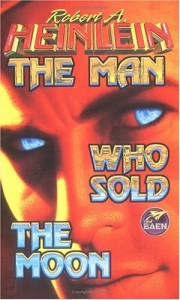
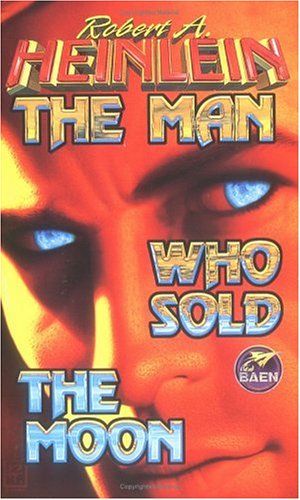
This month we are reading and discussing The Man Who Sold the Moon by Robert Heinlein:
This is not a novel but a collection of shorter fiction by Robert Heinlein that fall within his loose-knit Future History series. The title story, also the longest, is a novella about businessman D.D. Harriman’s dream of being the first to travel to and possess the moon, his schemes to raise capital in legitimate and semi-legitimate ways, and his efforts to avoid government ownership of the moon. The remaining short stories are “Life Line,” “Let There be Light,” “The Roads Must Roll,” “Blowups Happen,” and “Requiem.”
Moon only available on Amazon in mass market paperback, so order your copy soon. If you buy the book through our affiliate links you’ll be supporting our work here at Prometheus Unbound without costing yourself anything extra.
Join us as we read and discuss The Man Who Sold the Moon.
We’re reading the stories by internal chronological order rather than the order in which they appear in the book. I’ve written a post in the forum listing the stories in proper order and explaining why.
You need not have voted on this month’s selection to join in the discussion, but you do need to be registered and logged in on this site to access the book club’s dedicated forums.
October Recap
We’ve been reading J. Neil Schulman’s classic dystopian science fiction novel Alongside Night, winner of the Prometheus Hall of Fame Award and currently being adapted into a movie starring Kevin Sorbo (Hercules, Andromeda).
Official discussion is still open if you want to chime in before the live author chat with Schulman on November 10th. For more information on this event, see the Google+ event page. The discussion will be retired to the TLR — Previous Reads forum after the event, where discussion can continue without distracting from discussion of this month’s read.
[continue reading…]
Help Promote Prometheus Unbound by Sharing this Post
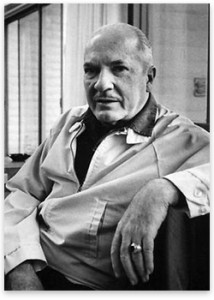
Robert Anson Heinlein (1907–1988)
In this episode of the Libertarian Tradition podcast series, part of the Mises Institute’s online media library, Jeff Riggenbach discusses the life of Robert Anson Heinlein (1907–1988), author of The Moon Is a Harsh Mistress and many other wonderful novels and short stories, and addresses the question of whether Heinlein was a libertarian.
You can also read the transcript below:
When Robert Anson Heinlein died 22 years ago this month, in Carmel, California, at the age of 80, the wonder of it all was that he had managed to live as long as he did. Heinlein, who was born in 1907 in Butler, Missouri, a small town about 65 miles south of Kansas City, had been in poor health for most of his adult life.
His family had connections with the powerful Pendergast political machine, the outfit that later put Harry Truman in the US Senate, but Heinlein still had to spend his freshman year in a two-year Kansas City “junior college” — what today we would call a “community college” — before the Pendergast machine was finally able to wrangle him an appointment to Annapolis. After graduating from the naval academy in 1929 with a degree in mechanical engineering, Heinlein went to sea as an officer. But in his fourth year of active duty, he contracted tuberculosis and was honorably discharged — retired, really, with a small pension — after a lengthy hospitalization at Navy expense.
[continue reading…]
Help Promote Prometheus Unbound by Sharing this Post

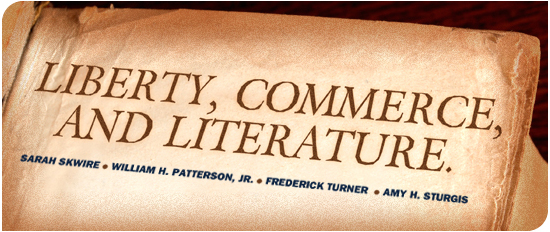
The July issue of Cato Unbound is on the topic of Liberty, Commerce, and Literature — more specifically, whether Western literature is anti-commerce, to what extent, and why.
Like Prometheus Unbound, Cato Unbound is an online magazine, unbound and free of the limits of the dead-tree format, although they maintain a regular monthly schedule while we do not. Each month they cover a different big topic and invite several eminent thinkers to discuss it.
Cato Unbound invites their readers to take part in the discussion on their own websites, blogs, social networks, and the like. Particularly good posts could be officially included in the issue.
Lead Essay
This month’s lead essayist is literary scholar Sarah Skwire. In “Birth of the Clichés,” she argues that — contrary to mainstream and libertarian perception — the evidence that Western literature is anti-commerce is actually thin. Instead, she presents a more nuanced view “in which critiques of the market stand side by side with favorable depictions and even sound, encouraging advice for would-be businessmen.”
[continue reading…]
Help Promote Prometheus Unbound by Sharing this Post


Nominations are now closed for our June read. It’s time to vote on the book we’re going to read next month.
Here are the candidates:
Shadow and Claw is comprised of the first two books of Gene Wolfe’s four-volume The Book of the New Sun (1980–83), which is a critically acclaimed work of far-future science fantasy in the Dying Earth tradition of Jack Vance. The Shadow of the Torturer is the tale of young Severian, an apprentice in the Guild of Torturers on the world called Urth, exiled for committing the ultimate sin of his profession — showing mercy toward his victim. The Claw of the Conciliator continues the saga of Severian, banished from his home, as he undertakes a mythic quest to discover the awesome power of an ancient relic, and learn the truth about his hidden destiny.
Farnham’s Freehold by Robert Heinlein — It’s a cross-time fight for freedom as a family retreats to a bomb shelter during a nuclear attack — only to emerge hundreds of years in the future, thrown forward in time by the blasts. There lifeboat ethics rule as they struggle to survive … until they’re discovered by up-time humans, the survivors of the apocalypse. These survivors are of African descent. Down-time humans — in fact, all of the European-descended — are held guilty for the state into which the world has fallen and designated as automatic slaves. The only escape is to find a way back down-time, to change events sufficiently to make absolute certain this nightmare future never get a chance to happen in the first place!
The Freedom Maze — Delia Sherman’s young-adult fantasy novel focuses on an adolescent girl of 1960 who is magically sent back in time to 1860 when her family owned slaves on a Louisiana plantation. With her summer tan, she’s mistaken for a slave herself, and she learns the hard way what life was like. In the process, she comes to appreciate the values of honor, respect, courage, and personal responsibility.
Ready Player One — Ernest Cline’s genre-busting blend of science fiction, romance, suspense, and adventure describes a virtual world that has managed to evolve an order without a state and where entrepreneurial gamers must solve virtual puzzles and battle real-life enemies to save their virtual world from domination and corruption. The novel also stresses the importance of allowing open access to the Internet for everyone.
Snuff — A Discworld novel by Terry Pratchett (winner of a Prometheus Award for Night Watch, also set in Discworld), Snuff blends comedy, drama, satire, suspense and mystery as a police chief investigates the murder of a goblin and finds himself battling discrimination. The mystery broadens into a powerful drama to extend the world’s recognition of rights to include these long-oppressed and disdained people with a sophisticated culture of their own.
[continue reading…]
Help Promote Prometheus Unbound by Sharing this Post



















